Dec 3, 2017 | News
Neuro-surgery interfaces the head transplantation idea
24 November 2017 – Round table seminar
Abstract
The first edition of the masterclass in Neurobioethics, “Neurobioethics and transhumanism”, fully entered the main problem addressed not only by the masterclass, but by all the research path that, during next five years, the interdisciplinary research group in Neurobioethics (GdN) will face, in other words the head transplantation and the effective opening of the Trans and Post-humanist panorama. The internationally renowned neurosurgeon, prof. Aldo Spallone, last November 24, outlined the clash-meeting between Neurosurgery and this so long-awaited event.
Thanks to the lecture given by the internationally renowned neurosurgeon, prof. Aldo Spallone, last 24 November, during the third meeting of the masterclass in Neurobioethics, “Neurobioethics and Transhumanism”, many participating scholars had access to the specific practice of this topic, actual core of what expected above and beyond neurosciences. Father Alberto Carrara, Coordinator of the GdN and of the masterclass, already prepared during the previous meetings a plot (scientific, philosophical and notional), updated to the most recent developments, about possibilities, expectations and goals of the Trans and Posthumanist movement. In accordance with the masterclass structure, in fact, the need is to show quantity and quality of the issues raised by this intervention, which will significantly result in new interdisciplinary answers, as well as in the first step towards an escalation predetermined by internal names of these two wellknown movements, Trans and Post-humanism.
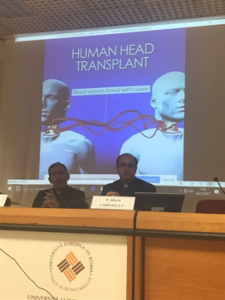 During the introductory presentation, the steps already taken during previous lessons has been recalled: the so-called head transplantation is close; probable and craved transhumanist goal, which stresses out the minds of those who are following its development. The whole philosophy from which Canavero’s experimentation originates, however, is the same which stands behind the famous “2045 Initiative”, whose cultural assumptions are strongly critical about contemporary society; reason why redemption has to come through a new kind of humanity, achievable during the era of digital immortality. Anxiety and hope are the two opposing reactions and perceptions generated by this future vision of humanity, who is tottering between her own improvement and the danger that, while trying to reach this improvement through the “Immortality Project”, she would no longer fully recognize her human nature, at the point to risk to lose it. The imminence of the problematic issues about objects of neuroethics interest (personal autonomy, privacy, subjective identity, rights and equality in the therapeutic field related to the costs that such interventions would require, etc..) is already an international political discussion item.
During the introductory presentation, the steps already taken during previous lessons has been recalled: the so-called head transplantation is close; probable and craved transhumanist goal, which stresses out the minds of those who are following its development. The whole philosophy from which Canavero’s experimentation originates, however, is the same which stands behind the famous “2045 Initiative”, whose cultural assumptions are strongly critical about contemporary society; reason why redemption has to come through a new kind of humanity, achievable during the era of digital immortality. Anxiety and hope are the two opposing reactions and perceptions generated by this future vision of humanity, who is tottering between her own improvement and the danger that, while trying to reach this improvement through the “Immortality Project”, she would no longer fully recognize her human nature, at the point to risk to lose it. The imminence of the problematic issues about objects of neuroethics interest (personal autonomy, privacy, subjective identity, rights and equality in the therapeutic field related to the costs that such interventions would require, etc..) is already an international political discussion item.
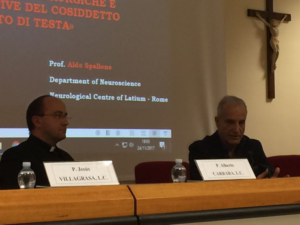 What explained by the esteemed neurosurgeon Aldo Spallone traces the academic and professional history of his colleague Canavero, pointing the link between his actual project “Heaven/Gemini”, in addition to his purpose, scheduled for 2020, to transplant a human brain into a machine (producing so a new humankind), and his concern, his particular awareness towards the issue of pain in the early days of his career, following the path which inspired his study of this issue. The Turinese neurosurgeon, along with his Chinese colleague Ren Xiaoting, proposes a series of “smoky” experiments, considered so by most of the scientific community, related in their technical aspect to standardized protocols, adopted without mitigating preexisting doubts about certain steps, such as for using the “sealant PEG”, whose function is to ensure the restoration of the integrity of the cutted nervous fiber; a technical device source of widespread skepticism.
What explained by the esteemed neurosurgeon Aldo Spallone traces the academic and professional history of his colleague Canavero, pointing the link between his actual project “Heaven/Gemini”, in addition to his purpose, scheduled for 2020, to transplant a human brain into a machine (producing so a new humankind), and his concern, his particular awareness towards the issue of pain in the early days of his career, following the path which inspired his study of this issue. The Turinese neurosurgeon, along with his Chinese colleague Ren Xiaoting, proposes a series of “smoky” experiments, considered so by most of the scientific community, related in their technical aspect to standardized protocols, adopted without mitigating preexisting doubts about certain steps, such as for using the “sealant PEG”, whose function is to ensure the restoration of the integrity of the cutted nervous fiber; a technical device source of widespread skepticism.
 There are therefore some strong perplexities about timings of the attempt set for next 17th December: it seems that different personalities from the scientific community consider the attempt premature, particularly because of the problematic glitch that the connection between the two spinal marrows represents. Even admitting its success, there are three possible scenarios: the transplantion is successful, but the patient doesn’t regain consciousness; the patient regains consciousness, but it is unknown what will happen to the marrow (it’s an high section cervical transplantation where the survival rate on average is 4 years circa); head and spinal marrow work correctly and Canavero successfully reaches his goal (evidently the last two hypothesis feed cultural, legal, geopolitical, spiritual, philosophical, bioethical, etc… issues, the same analyzed during the masterclass).
There are therefore some strong perplexities about timings of the attempt set for next 17th December: it seems that different personalities from the scientific community consider the attempt premature, particularly because of the problematic glitch that the connection between the two spinal marrows represents. Even admitting its success, there are three possible scenarios: the transplantion is successful, but the patient doesn’t regain consciousness; the patient regains consciousness, but it is unknown what will happen to the marrow (it’s an high section cervical transplantation where the survival rate on average is 4 years circa); head and spinal marrow work correctly and Canavero successfully reaches his goal (evidently the last two hypothesis feed cultural, legal, geopolitical, spiritual, philosophical, bioethical, etc… issues, the same analyzed during the masterclass).
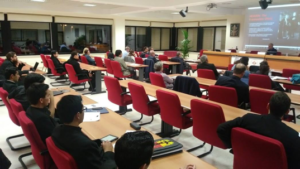 Clearly it is necessary, beyond the feasibility of the procedure, to dwell on “who” will be the “patient-hybrid” resulting from the procedure, main theme of the philosophical inquiry along with the purely bioethical consideration on the definitory frontier between health and disease, therapeutic and non-therapeutic, which additionally lies in the gap between Ren and Canavero, where the first one intends purely therapeutic purposes; the second instead publicly admitted his former support to the “2045 Initiative” or, in simple terms, intends to pursue immortality. How cleverly introduced by the Rector of the Pontifical Atheneum Regina Apostolorum, F. Jesús Villagrasa, and then recalled by the Director of the UNESCO Chair in Bioethics and Human Rights, the jurist Alberto García, the emergency engraved in these “radical medical interventions” would relapse on many fronts. Head transplantation specifically demands more careful sensitivities to the informed consent involved between the subjects, patients, each one coming from different and varied contexts (politically and culturally), suffering from serious and debilitating illnesses; therefore it becomes more urgent to take on responsibility, already fully accepted and exercised during the dialogue between many areas and sectors involved in the same conversation, if we consider it in light of the person, of her centrality and her human, ethical values, which affect and wholly define her; the same values recognized by law as a tool of safeguard and guarantee, which are enduring over the possible innovations, promoting a reflection on their own “ethicality”.
Clearly it is necessary, beyond the feasibility of the procedure, to dwell on “who” will be the “patient-hybrid” resulting from the procedure, main theme of the philosophical inquiry along with the purely bioethical consideration on the definitory frontier between health and disease, therapeutic and non-therapeutic, which additionally lies in the gap between Ren and Canavero, where the first one intends purely therapeutic purposes; the second instead publicly admitted his former support to the “2045 Initiative” or, in simple terms, intends to pursue immortality. How cleverly introduced by the Rector of the Pontifical Atheneum Regina Apostolorum, F. Jesús Villagrasa, and then recalled by the Director of the UNESCO Chair in Bioethics and Human Rights, the jurist Alberto García, the emergency engraved in these “radical medical interventions” would relapse on many fronts. Head transplantation specifically demands more careful sensitivities to the informed consent involved between the subjects, patients, each one coming from different and varied contexts (politically and culturally), suffering from serious and debilitating illnesses; therefore it becomes more urgent to take on responsibility, already fully accepted and exercised during the dialogue between many areas and sectors involved in the same conversation, if we consider it in light of the person, of her centrality and her human, ethical values, which affect and wholly define her; the same values recognized by law as a tool of safeguard and guarantee, which are enduring over the possible innovations, promoting a reflection on their own “ethicality”.
So the anthropological reflection on the integrity and the value of the person is the closest thing there is to the hypothetical goal of Sergio Canavero: the complexity of the head-body transplantation is not exclusively a purely practical complexity; we know in fact that before the doing, intended as “to able to do”, there is the analysis about the right for the person, that that possibility displays or not. “We are on a border (…) what is in the running, it may be too much»: consciousness, soul, identity are factors here called into question, subordinate to new languages following an intervention that would act on and for the suffering of a certain condition; but, doing this, it obviously affects the whole human being from whom no disease or dysfunction may be considered separate. Prof. Garcia highlights, integrating the anthropological structure of this issue, even the action of Governments and States, if Dr. Canavero’s challenge should gauarantee a success. We must not forget the social implications that require experts to recall the centrality of the human being and of human rights as core from which social ramifications depart and get more complicated.
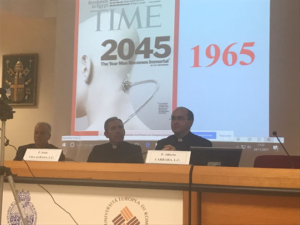 It’s fundamental to recompose the question about the purpose which leads to the use of human and material resources, in other words if the contribution to humanity have here a genuinely dystopian value, going to detriment of mankind while pushed from the power associated to progress, or if, on the other hand, it could be ethically thinkable (or even needed) such a medical intervention, in order to combine what presented and waited for the next December with medicine’s proper therapeutic vocation and with a research at the service of mankind, because she loves mankind. We need to discern the nature of the body-head transplantation with critical thinking. What was said during the third meeting of the first masterclass in Neurobioethics leads us to reevaluate the meaning of limit as an humankind distinctive element, in order to not run in the shadows of a new ethic of in-equality.
It’s fundamental to recompose the question about the purpose which leads to the use of human and material resources, in other words if the contribution to humanity have here a genuinely dystopian value, going to detriment of mankind while pushed from the power associated to progress, or if, on the other hand, it could be ethically thinkable (or even needed) such a medical intervention, in order to combine what presented and waited for the next December with medicine’s proper therapeutic vocation and with a research at the service of mankind, because she loves mankind. We need to discern the nature of the body-head transplantation with critical thinking. What was said during the third meeting of the first masterclass in Neurobioethics leads us to reevaluate the meaning of limit as an humankind distinctive element, in order to not run in the shadows of a new ethic of in-equality.
Sep 28, 2017
The Director of the UNESCO Chair in Bioethics and Human Rights Prof Alberto Garcia, will be a speaker of the Master Conference on “Transhumanism and Human Rights”.
The main purpose of the Congress is to relate the current context of the history of humanity intended as Postmodernity, with its phenomena and contradictions with Transhumanism, which represents a new operative conception of the future of the human being. This conception competes with scientists and experts of different knowledge sectors such as: artificial intelligence, neuroscience, nanotechnology and applied biotechnology, such as health oriented and so-called gray biotechnology, which is made up of all those applications directly to the environment, which in turn are subdivided into two large applications: the maintenance of biodiversity and the elimination of pollutants, issues that have to do with pollution present in many parts of the world.
Aug 3, 2017 | News
by Giulia Bovassi
The 2016/17 closing meeting of the Interdisciplinary Research Group in Neurobioethics (GdN), chaired by Coordinator F. Alberto Carrara, LC, took place in the afternoon of June 23, with the active participation of various members and collaborators. The occasion was conclusive, but at the same time opened to the 2017/18 research and training program scheduling, which will focus on the theme “From head transplantation to personal identity, from human rights to eschatology. A year of considerations on Trans-Humanism last frontiers”.
The seminar, held at the Ateneo Pontificio Regina Apostolorum in collaboration with the “Science and Faith Institute” and the “UNESCO Chair in Bioethics and Human Rights”, has proposed, through a detailed and participatory study, the general lines of the research and study path which it intends to pursue for the next academic year 2017-2018; a year when one of the most exciting and emerging topics in neurosciences and bioethics studies, trans-humanism, will figure as protagonist. We are talking specifically about the issue of the “long-waited” head transplantation, which will be attempted for the first time in December 2017, and about the persistent problem of personal identity, related to the phases before and after the event.
As clearly explained in the seminar’s introduction, and then repeated during the interventions, the subject will find space for analysis and discussion under different perspectives: from neurosurgery to neurosciences; from psychiatric and psychological contributions to philosophical, theological approaches and, then, achieving Law, adopting particular emphasis on the Informed Consent in condition of vulnerability, and about the value of physicality along with the awareness of body’s importance in relation to the person.
 The first human head transplantation (or, as highlighted by Professor A. Carrara, “most of the body transplantation”) has to be considered a decisive step towards trans-humanist aspirations, reason why the news not only remains under the national media spotlights, but also it’s pointed out by active and influential contemporary movements devoted to trans-humanism, as well as it certainly represents a milestone for scientific research. The Italian neurosurgeon, Dr. Sergio Canavero, will lead the team that will collaborate with him on the “Human Head Transplantation” procedure, which currently seems it will be performed in China at Harbin Medical University, on a healthy body volunteer whose identity is still uncertain (initially it had to be a Russian quadriplegic, then replaced by a Chinese man, condemned to capital punishment, to overcome compatibility issues).
The first human head transplantation (or, as highlighted by Professor A. Carrara, “most of the body transplantation”) has to be considered a decisive step towards trans-humanist aspirations, reason why the news not only remains under the national media spotlights, but also it’s pointed out by active and influential contemporary movements devoted to trans-humanism, as well as it certainly represents a milestone for scientific research. The Italian neurosurgeon, Dr. Sergio Canavero, will lead the team that will collaborate with him on the “Human Head Transplantation” procedure, which currently seems it will be performed in China at Harbin Medical University, on a healthy body volunteer whose identity is still uncertain (initially it had to be a Russian quadriplegic, then replaced by a Chinese man, condemned to capital punishment, to overcome compatibility issues).
 During the meeting, the GdN, coherently with its interdisciplinary character, saw the presentation of several expert voices, each of which, as spokesperson of a different type of contribution, suggested questions or topics useful to the research project for the year 2017-2018, thus already sketching a 360-degree coverage for the entire route; this will take its final shape during the second module of the APRA Faculty of Bioethics / Science and Faith Summer Course, scheduled for July 2018 and focused on “Enhancement and Emerging Technologies”, but it will be preceded by a “mature fruit”, namely the Brain Awareness Week promoted by the DANA Foundation.
During the meeting, the GdN, coherently with its interdisciplinary character, saw the presentation of several expert voices, each of which, as spokesperson of a different type of contribution, suggested questions or topics useful to the research project for the year 2017-2018, thus already sketching a 360-degree coverage for the entire route; this will take its final shape during the second module of the APRA Faculty of Bioethics / Science and Faith Summer Course, scheduled for July 2018 and focused on “Enhancement and Emerging Technologies”, but it will be preceded by a “mature fruit”, namely the Brain Awareness Week promoted by the DANA Foundation.
Seminars and roundtable discussions will be carried out around this topic: from neurosurgical, bioethical, legal, psychological, anthropological, philosophical and psychiatric aspects to health and social issues, until the consequences that follow the so-called “head transplantation” and its scientific-cultural backgrounds, ensuring so the possibility to arrive, through the gradualness and orderliness proper of an academic and multidisciplinary study pathway, at the point where significant and solid conceptual instruments are nimbly avalaible in order to face the open discussion about identity and subject’s approach towards its own body (which is semantically extended more than its physicality).
 UNESCO Chair in Bioethics and Human Rights contribution to the research program has been revealed in advance by the Director of the Chair, Professor Alberto Garcia: the contribution will be focused on the delicate and specific issue of Informed Consent, primarily raised for what concerns the relationship between the transplantation perspective and the position of the subjects considered to be most vulnerable, such as quadriplegic patients or who is affected by pathologies which weaken the motor system; this is valid also for the people whose political-social and cultural context does not allow, directly or indirectly, the full exercise of the rights established by the Universal Declaration of Human Rights.
UNESCO Chair in Bioethics and Human Rights contribution to the research program has been revealed in advance by the Director of the Chair, Professor Alberto Garcia: the contribution will be focused on the delicate and specific issue of Informed Consent, primarily raised for what concerns the relationship between the transplantation perspective and the position of the subjects considered to be most vulnerable, such as quadriplegic patients or who is affected by pathologies which weaken the motor system; this is valid also for the people whose political-social and cultural context does not allow, directly or indirectly, the full exercise of the rights established by the Universal Declaration of Human Rights.
The principles invoked focus on the effective awareness of an eventual consent, adopting a deep attitude of prudence and caution on evaluating as consciously free the decision to undergo to specific interventions in a personal situation soaked and driven by suffering, or characterized by a sometimes desperate past (topic also touched by Professor Cotroneo together with the hypnotherapy role on patients close to the transplantation therapeutic option, starting from the already feasible operations -hand, arm, etc…- whose discomforts are equally attested and present in literature). Then if we add to this the temporal hypothesis, namely future side effects and perspectives reasonably expected from the quality of life’s point of view, the impasse quickly emerges on several fronts.
I-CONSENT (Improving guidelines for Informed Consent, including vulnerable populations, under a gender perspective) is the European project of considerable reach, provided by Horizon 2020, the European Union Research and Innovation Framework Program, won by the consortium in which participates the UNESCO Chair in Bioethics and Human Rights, which will take care over three years to investigate the bays of Informed Consent, with particular regard to vulnerable populations.
It is a project in which the collaboration between the different partners aims to improve the reference guidelines in the theoretical and practical treatment of the theme extended to both sexes, beyond age limits and pre-emptively compared to the rise of cultural or religious barriers in the concrete of specific situations, which lead to the practice of consensus. A special focus will be applied on the issue of vaccinations (crux and difficulties, related especially to children/teenagers, women, even more specifically pregnant women, will be handled rigorously and systematically) and of ethical issues regarding the IC in medicine, particularly in the scientific research; a desired perspective of a result that not only can ensure close proximity between citizens and healthcare, rather a collaborative relationship and a rational, in all respects, informed interconnection.
The group of UNESCO-led researchers working on the project will discuss ethical, legal, scientific tools to be provided to the community to fill some of the current situations of “emptiness”/difficulties at managing consensus in comparison with cultural and religious pluralism, from which we have the duty to protect and respect liberty and, in this case, the self-determination of the subjects involved, first of all those who trust the doctor, the specialist and the research.
Clearly, at this last meeting of GdN, the interesting collaboration with i-CONSENT will consist on constantly bring attention to the freedom of patients suffering from invasive pathologies, which lead to an existential past of suffering and that sometimes affects the decision of the subject to undergo certain interventions or treatments, as might happen in the case of head transplantation.
Here so the Program will adopt as horizon not exclusively the legal term of patient’s avalaibility to informed consent and the legal validity of research, but it will overcome ethics and deontology while remaining complied to one of the major social problems currently facing the healthcare sector: the balance between trust and distrust; possible or illusory hope; legality or wrongfulness, mutually interconnected and not rarely stumbling.
Next year we will then see many disciplines and authoritative personalities work together, united by the common interest towards man and his benefit within neuroscience innovation.
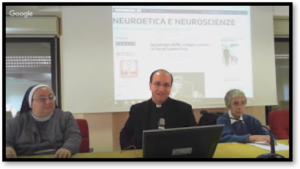 How should theology interpret transhumanism? What can be said about the man’s relation to God, his spiritual striving, and his self-understanding? These are just some of the questions that emerged during the meeting on Friday April 20 during the speeches held by professors Giorgia Salatiello and Sr. Daniela Del Gaudio.
How should theology interpret transhumanism? What can be said about the man’s relation to God, his spiritual striving, and his self-understanding? These are just some of the questions that emerged during the meeting on Friday April 20 during the speeches held by professors Giorgia Salatiello and Sr. Daniela Del Gaudio.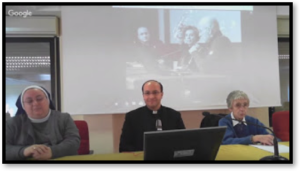 GdN coordinator Fr. Alberto Carrara, discussed how many thinkers disregard a specific vision about human nature and consequently ethical action. He insisted that human acts cannot be isolated from a relationship with freedom, responsibility and dignity, which are decisive elements for every medical action. The doctor should join, assemble, restore the functioning between the living body and the deceased donor’s body. The doctor could, erroneously, glimpse a mere “producing” in what he is doing, reducing the meeting between doctor and patient to an approach between an operator and an object. In the body transplantation case, one’s original vocation is to take care for the other. Every ill person directs his fears and hopes to the other person’s competence, letting the doctor enter his lives in a concrete act of trust, both professional and human.
GdN coordinator Fr. Alberto Carrara, discussed how many thinkers disregard a specific vision about human nature and consequently ethical action. He insisted that human acts cannot be isolated from a relationship with freedom, responsibility and dignity, which are decisive elements for every medical action. The doctor should join, assemble, restore the functioning between the living body and the deceased donor’s body. The doctor could, erroneously, glimpse a mere “producing” in what he is doing, reducing the meeting between doctor and patient to an approach between an operator and an object. In the body transplantation case, one’s original vocation is to take care for the other. Every ill person directs his fears and hopes to the other person’s competence, letting the doctor enter his lives in a concrete act of trust, both professional and human.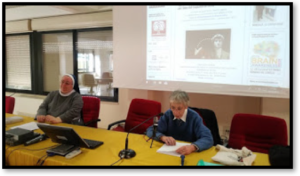 The two interventions, “Theological Anthropology Questions about the Recent Scenarios Raised by Transhumanism” by Prof. Giorgia Salatiello (Pontifical Gregorian University) and “The Creational Destination of Man to Immortality: Identity and Resurrection” by Prof. Sr. Daniela Del Gaudio (Pontifical Urbaniana University), extended the consideration to the central points of the Trans and Posthumanist movement, and theology, in some concepts of common interest (for example immortality, life, meaning of death, of freedom, of corporeality, of the person and the task entrusted to him when God is perceived in his origins), promoting an exchange as constructive as possible. In this sense, during the first intervention some themes, particularly suggested throughout the Masterclass’s opening lectures, re-emerged, confirming the fact that, using Prof. Salatiello’s words, «transhumanism constitutes a major challenge for theological anthropology»: to embrace a vision of the human being as a creature implies that our free action is not arbitrariness (without constraints, bare of foundations); greater dependence on God implies greater freedom because God places the creature free (in the Christian conception freedom is constitutively oriented to the good). The concept of “person” is a notion that contains in itself the relationship with God, the uniqueness of the individual and, again, the free response to the loving call.
The two interventions, “Theological Anthropology Questions about the Recent Scenarios Raised by Transhumanism” by Prof. Giorgia Salatiello (Pontifical Gregorian University) and “The Creational Destination of Man to Immortality: Identity and Resurrection” by Prof. Sr. Daniela Del Gaudio (Pontifical Urbaniana University), extended the consideration to the central points of the Trans and Posthumanist movement, and theology, in some concepts of common interest (for example immortality, life, meaning of death, of freedom, of corporeality, of the person and the task entrusted to him when God is perceived in his origins), promoting an exchange as constructive as possible. In this sense, during the first intervention some themes, particularly suggested throughout the Masterclass’s opening lectures, re-emerged, confirming the fact that, using Prof. Salatiello’s words, «transhumanism constitutes a major challenge for theological anthropology»: to embrace a vision of the human being as a creature implies that our free action is not arbitrariness (without constraints, bare of foundations); greater dependence on God implies greater freedom because God places the creature free (in the Christian conception freedom is constitutively oriented to the good). The concept of “person” is a notion that contains in itself the relationship with God, the uniqueness of the individual and, again, the free response to the loving call.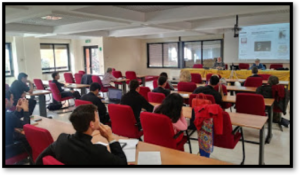 Transhumanist language often indicates a fluid, evolutionary view of the human being, together with the lack of distinction between him and artifacts or between man and animal. The individual (a term more commonly used precisely because it can underline the ontological poverty in the definition of person) is drastically reduced to the dualistic vision of himself.
Transhumanist language often indicates a fluid, evolutionary view of the human being, together with the lack of distinction between him and artifacts or between man and animal. The individual (a term more commonly used precisely because it can underline the ontological poverty in the definition of person) is drastically reduced to the dualistic vision of himself.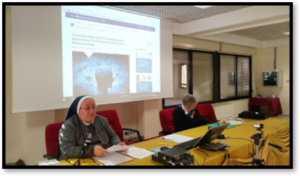 In the resurrection, the soul will reshape the matter in that same form that «virtually preserves in itself», our corporeity will be transfigured and renewed on the model of Christ. The encounter with Christ marks a new life and following of Christ reveals the vocation to immortality, a call to eternal life. The Catholic Church affirms that there is a resurrection: our body preserves its identity in it and the human Ego subsists and survives, despite the dissolution of the body. Through Christ’s victory over death, which becomes a liberation and fulfillment. Here death, suffering, and pain finds new meaning and eternal life perpetuates the call to live with Christ, a communion that makes all other relationships more complete and alive.
In the resurrection, the soul will reshape the matter in that same form that «virtually preserves in itself», our corporeity will be transfigured and renewed on the model of Christ. The encounter with Christ marks a new life and following of Christ reveals the vocation to immortality, a call to eternal life. The Catholic Church affirms that there is a resurrection: our body preserves its identity in it and the human Ego subsists and survives, despite the dissolution of the body. Through Christ’s victory over death, which becomes a liberation and fulfillment. Here death, suffering, and pain finds new meaning and eternal life perpetuates the call to live with Christ, a communion that makes all other relationships more complete and alive.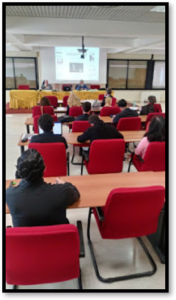 At the conclusion of the round-table seminar, there was a debate on the ideas of the “Letter Placuit Deo to the Bishops of the Catholic Church on Certain Aspects of Christian Salvation” of the Congregation for the Doctrine of the Faith, in which explicit reference is made to two tendencies now widely spread, or from which certain school of thought seem to draw inspiration: neo-Pelagianism and neo-Gnosticism. The first consists in man’s effort to achieve salvation by himself, observable in the way he uses (or becomes a servant of) the technique, then robotics, technologies, etc; the second seeks a subjective salvation through the liberation from the body. Transhumanism contains tendencies toward both of these two approaches, «two temptations of the human being».
At the conclusion of the round-table seminar, there was a debate on the ideas of the “Letter Placuit Deo to the Bishops of the Catholic Church on Certain Aspects of Christian Salvation” of the Congregation for the Doctrine of the Faith, in which explicit reference is made to two tendencies now widely spread, or from which certain school of thought seem to draw inspiration: neo-Pelagianism and neo-Gnosticism. The first consists in man’s effort to achieve salvation by himself, observable in the way he uses (or becomes a servant of) the technique, then robotics, technologies, etc; the second seeks a subjective salvation through the liberation from the body. Transhumanism contains tendencies toward both of these two approaches, «two temptations of the human being».
 During the introductory presentation, the steps already taken during previous lessons has been recalled: the so-called head transplantation is close; probable and craved transhumanist goal, which stresses out the minds of those who are following its development. The whole philosophy from which Canavero’s experimentation originates, however, is the same which stands behind the famous “2045 Initiative”, whose cultural assumptions are strongly critical about contemporary society; reason why redemption has to come through a new kind of humanity, achievable during the era of digital immortality. Anxiety and hope are the two opposing reactions and perceptions generated by this future vision of humanity, who is tottering between her own improvement and the danger that, while trying to reach this improvement through the “Immortality Project”, she would no longer fully recognize her human nature, at the point to risk to lose it. The imminence of the problematic issues about objects of neuroethics interest (personal autonomy, privacy, subjective identity, rights and equality in the therapeutic field related to the costs that such interventions would require, etc..) is already an international political discussion item.
During the introductory presentation, the steps already taken during previous lessons has been recalled: the so-called head transplantation is close; probable and craved transhumanist goal, which stresses out the minds of those who are following its development. The whole philosophy from which Canavero’s experimentation originates, however, is the same which stands behind the famous “2045 Initiative”, whose cultural assumptions are strongly critical about contemporary society; reason why redemption has to come through a new kind of humanity, achievable during the era of digital immortality. Anxiety and hope are the two opposing reactions and perceptions generated by this future vision of humanity, who is tottering between her own improvement and the danger that, while trying to reach this improvement through the “Immortality Project”, she would no longer fully recognize her human nature, at the point to risk to lose it. The imminence of the problematic issues about objects of neuroethics interest (personal autonomy, privacy, subjective identity, rights and equality in the therapeutic field related to the costs that such interventions would require, etc..) is already an international political discussion item. What explained by the esteemed neurosurgeon Aldo Spallone traces the academic and professional history of his colleague Canavero, pointing the link between his actual project “Heaven/Gemini”, in addition to his purpose, scheduled for 2020, to transplant a human brain into a machine (producing so a new humankind), and his concern, his particular awareness towards the issue of pain in the early days of his career, following the path which inspired his study of this issue. The Turinese neurosurgeon, along with his Chinese colleague Ren Xiaoting, proposes a series of “smoky” experiments, considered so by most of the scientific community, related in their technical aspect to standardized protocols, adopted without mitigating preexisting doubts about certain steps, such as for using the “sealant PEG”, whose function is to ensure the restoration of the integrity of the cutted nervous fiber; a technical device source of widespread skepticism.
What explained by the esteemed neurosurgeon Aldo Spallone traces the academic and professional history of his colleague Canavero, pointing the link between his actual project “Heaven/Gemini”, in addition to his purpose, scheduled for 2020, to transplant a human brain into a machine (producing so a new humankind), and his concern, his particular awareness towards the issue of pain in the early days of his career, following the path which inspired his study of this issue. The Turinese neurosurgeon, along with his Chinese colleague Ren Xiaoting, proposes a series of “smoky” experiments, considered so by most of the scientific community, related in their technical aspect to standardized protocols, adopted without mitigating preexisting doubts about certain steps, such as for using the “sealant PEG”, whose function is to ensure the restoration of the integrity of the cutted nervous fiber; a technical device source of widespread skepticism. There are therefore some strong perplexities about timings of the attempt set for next 17th December: it seems that different personalities from the scientific community consider the attempt premature, particularly because of the problematic glitch that the connection between the two spinal marrows represents. Even admitting its success, there are three possible scenarios: the transplantion is successful, but the patient doesn’t regain consciousness; the patient regains consciousness, but it is unknown what will happen to the marrow (it’s an high section cervical transplantation where the survival rate on average is 4 years circa); head and spinal marrow work correctly and Canavero successfully reaches his goal (evidently the last two hypothesis feed cultural, legal, geopolitical, spiritual, philosophical, bioethical, etc… issues, the same analyzed during the masterclass).
There are therefore some strong perplexities about timings of the attempt set for next 17th December: it seems that different personalities from the scientific community consider the attempt premature, particularly because of the problematic glitch that the connection between the two spinal marrows represents. Even admitting its success, there are three possible scenarios: the transplantion is successful, but the patient doesn’t regain consciousness; the patient regains consciousness, but it is unknown what will happen to the marrow (it’s an high section cervical transplantation where the survival rate on average is 4 years circa); head and spinal marrow work correctly and Canavero successfully reaches his goal (evidently the last two hypothesis feed cultural, legal, geopolitical, spiritual, philosophical, bioethical, etc… issues, the same analyzed during the masterclass). Clearly it is necessary, beyond the feasibility of the procedure, to dwell on “who” will be the “patient-hybrid” resulting from the procedure, main theme of the philosophical inquiry along with the purely bioethical consideration on the definitory frontier between health and disease, therapeutic and non-therapeutic, which additionally lies in the gap between Ren and Canavero, where the first one intends purely therapeutic purposes; the second instead publicly admitted his former support to the “2045 Initiative” or, in simple terms, intends to pursue immortality. How cleverly introduced by the Rector of the Pontifical Atheneum Regina Apostolorum, F. Jesús Villagrasa, and then recalled by the Director of the UNESCO Chair in Bioethics and Human Rights, the jurist Alberto García, the emergency engraved in these “radical medical interventions” would relapse on many fronts. Head transplantation specifically demands more careful sensitivities to the informed consent involved between the subjects, patients, each one coming from different and varied contexts (politically and culturally), suffering from serious and debilitating illnesses; therefore it becomes more urgent to take on responsibility, already fully accepted and exercised during the dialogue between many areas and sectors involved in the same conversation, if we consider it in light of the person, of her centrality and her human, ethical values, which affect and wholly define her; the same values recognized by law as a tool of safeguard and guarantee, which are enduring over the possible innovations, promoting a reflection on their own “ethicality”.
Clearly it is necessary, beyond the feasibility of the procedure, to dwell on “who” will be the “patient-hybrid” resulting from the procedure, main theme of the philosophical inquiry along with the purely bioethical consideration on the definitory frontier between health and disease, therapeutic and non-therapeutic, which additionally lies in the gap between Ren and Canavero, where the first one intends purely therapeutic purposes; the second instead publicly admitted his former support to the “2045 Initiative” or, in simple terms, intends to pursue immortality. How cleverly introduced by the Rector of the Pontifical Atheneum Regina Apostolorum, F. Jesús Villagrasa, and then recalled by the Director of the UNESCO Chair in Bioethics and Human Rights, the jurist Alberto García, the emergency engraved in these “radical medical interventions” would relapse on many fronts. Head transplantation specifically demands more careful sensitivities to the informed consent involved between the subjects, patients, each one coming from different and varied contexts (politically and culturally), suffering from serious and debilitating illnesses; therefore it becomes more urgent to take on responsibility, already fully accepted and exercised during the dialogue between many areas and sectors involved in the same conversation, if we consider it in light of the person, of her centrality and her human, ethical values, which affect and wholly define her; the same values recognized by law as a tool of safeguard and guarantee, which are enduring over the possible innovations, promoting a reflection on their own “ethicality”. It’s fundamental to recompose the question about the purpose which leads to the use of human and material resources, in other words if the contribution to humanity have here a genuinely dystopian value, going to detriment of mankind while pushed from the power associated to progress, or if, on the other hand, it could be ethically thinkable (or even needed) such a medical intervention, in order to combine what presented and waited for the next December with medicine’s proper therapeutic vocation and with a research at the service of mankind, because she loves mankind. We need to discern the nature of the body-head transplantation with critical thinking. What was said during the third meeting of the first masterclass in Neurobioethics leads us to reevaluate the meaning of limit as an humankind distinctive element, in order to not run in the shadows of a new ethic of in-equality.
It’s fundamental to recompose the question about the purpose which leads to the use of human and material resources, in other words if the contribution to humanity have here a genuinely dystopian value, going to detriment of mankind while pushed from the power associated to progress, or if, on the other hand, it could be ethically thinkable (or even needed) such a medical intervention, in order to combine what presented and waited for the next December with medicine’s proper therapeutic vocation and with a research at the service of mankind, because she loves mankind. We need to discern the nature of the body-head transplantation with critical thinking. What was said during the third meeting of the first masterclass in Neurobioethics leads us to reevaluate the meaning of limit as an humankind distinctive element, in order to not run in the shadows of a new ethic of in-equality. The first human head transplantation (or, as highlighted by Professor A. Carrara, “most of the body transplantation”) has to be considered a decisive step towards trans-humanist aspirations, reason why the news not only remains under the national media spotlights, but also it’s pointed out by active and influential contemporary movements devoted to trans-humanism, as well as it certainly represents a milestone for scientific research. The Italian neurosurgeon, Dr. Sergio Canavero, will lead the team that will collaborate with him on the “Human Head Transplantation” procedure, which currently seems it will be performed in China at Harbin Medical University, on a healthy body volunteer whose identity is still uncertain (initially it had to be a Russian quadriplegic, then replaced by a Chinese man, condemned to capital punishment, to overcome compatibility issues).
The first human head transplantation (or, as highlighted by Professor A. Carrara, “most of the body transplantation”) has to be considered a decisive step towards trans-humanist aspirations, reason why the news not only remains under the national media spotlights, but also it’s pointed out by active and influential contemporary movements devoted to trans-humanism, as well as it certainly represents a milestone for scientific research. The Italian neurosurgeon, Dr. Sergio Canavero, will lead the team that will collaborate with him on the “Human Head Transplantation” procedure, which currently seems it will be performed in China at Harbin Medical University, on a healthy body volunteer whose identity is still uncertain (initially it had to be a Russian quadriplegic, then replaced by a Chinese man, condemned to capital punishment, to overcome compatibility issues). During the meeting, the GdN, coherently with its interdisciplinary character, saw the presentation of several expert voices, each of which, as spokesperson of a different type of contribution, suggested questions or topics useful to the research project for the year 2017-2018, thus already sketching a 360-degree coverage for the entire route; this will take its final shape during the second module of the APRA Faculty of Bioethics / Science and Faith Summer Course, scheduled for July 2018 and focused on “Enhancement and Emerging Technologies”, but it will be preceded by a “mature fruit”, namely the Brain Awareness Week promoted by the DANA Foundation.
During the meeting, the GdN, coherently with its interdisciplinary character, saw the presentation of several expert voices, each of which, as spokesperson of a different type of contribution, suggested questions or topics useful to the research project for the year 2017-2018, thus already sketching a 360-degree coverage for the entire route; this will take its final shape during the second module of the APRA Faculty of Bioethics / Science and Faith Summer Course, scheduled for July 2018 and focused on “Enhancement and Emerging Technologies”, but it will be preceded by a “mature fruit”, namely the Brain Awareness Week promoted by the DANA Foundation. UNESCO Chair in Bioethics and Human Rights contribution to the research program has been revealed in advance by the Director of the Chair, Professor Alberto Garcia: the contribution will be focused on the delicate and specific issue of Informed Consent, primarily raised for what concerns the relationship between the transplantation perspective and the position of the subjects considered to be most vulnerable, such as quadriplegic patients or who is affected by pathologies which weaken the motor system; this is valid also for the people whose political-social and cultural context does not allow, directly or indirectly, the full exercise of the rights established by the Universal Declaration of Human Rights.
UNESCO Chair in Bioethics and Human Rights contribution to the research program has been revealed in advance by the Director of the Chair, Professor Alberto Garcia: the contribution will be focused on the delicate and specific issue of Informed Consent, primarily raised for what concerns the relationship between the transplantation perspective and the position of the subjects considered to be most vulnerable, such as quadriplegic patients or who is affected by pathologies which weaken the motor system; this is valid also for the people whose political-social and cultural context does not allow, directly or indirectly, the full exercise of the rights established by the Universal Declaration of Human Rights.